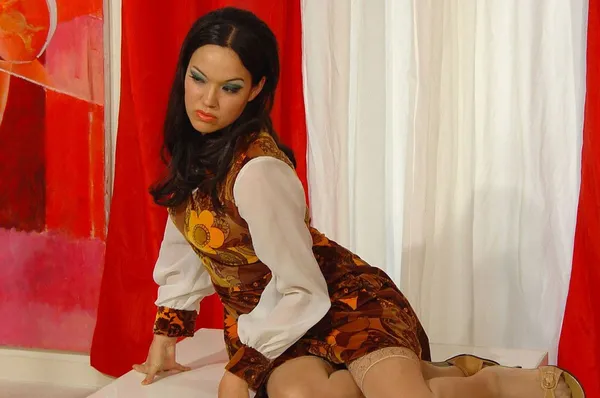Eye For Film >> Movies >> Viva (2007) Film Review

"Come and get it boys, this all-American dish is just for you…"
Bright, garish and tasteless, Viva is a loving, detailed tribute to the films of Russ Meyer and his ilk. Specialising in campy, soapy soft-core pornography, Meyer was someone who, depending on your view, was a skilled businessmen exploiting the burgeoning and more liberal market, a filmmaker full of fun and sense of humour, or a menace to both quality cinema and morals. Meyer’s ‘best’ films such as Beyond The Valley Of The Dolls and Faster Pussycat! Kill! Kill! possessed an unhinged, wanton sensibility that has been much admired, but is now little seen outside B-movie devotees. Perhaps this is why Anna Biller made Viva. And, regardless of your view, this elegy, made more than 30 years on from Meyer’s biggest box office successes, is a flesh-tastic cornucopia of vulgarity.

The eponymous Viva (Biller) is an LA housewife, who changes her name from Barbie after becoming bored with her life, and her husband (Chad England) in one of the cities more affluent suburbs. Along with her apparently equally disatisfied neighbour Sheila, who changes her name to Candy (Bridget Brno), she ends up drinking too much, taking drugs and meeting all kinds of unsavoury types in order to combat her ennui. However, at home her husband Rick’s heart becomes ill with worry, and is taken to hospital. As a final act of rebellion, Viva also falls into prostitution.
Biller presents a highly concentrated view of the period. It’s all nudist camps, Courvoisier, flares and floral prints; it’s more early Seventies than the early Seventies. The attention to detail, however, is impeccable, from the acting and dialogue, to the costumes and hairstyles. Even the truly dreadful musical numbers are authentic in their soporific benignity. The line "love is good for all humanity" is even sung at some point, and is, unlike its singer, pitch-perfect in its execution.
Sadly, the film’s playful innocence seems somewhat cold and calculated. It lacks the warmth, wit and spark of parodies such as Austin Powers. It’s hard to determine what Biller is trying to convey with the film. There is a distinct lack of commentary, feminist or otherwise, concerning proceedings. There is, however, a plethora of ‘knowing looks’ and self-conscious devices for us to be aware this is no simple recreation of a bygone period. On a more general level, the narrative also takes too long to get going, and the film is, for the most part, too restrained and self-conscious to be genuinely erotic.
If anything, it reminded me of Gus Van Sant’s Psycho in its joylessness. Van Sant, when asked about why he remade that film shot for shot, retorted: "So no one else had to". It feels the same here; it’s almost as if Biller is making a replica of the film in order to protect the originals from being spoilt, with just a couple of modern touches to differentiate it from them. The unfortunate consequence for every other person who cares about the originals is that, on some level, they now have been tarnished. Perhaps she made the film so people would revisit the Seventies movies. Either way, it would have been more productive if the means to either of these ends was also an end in itself, and not just a bland cipher for bigger causes.
So, if you’re going to let the rosé wine flow, are thinking about breaking out the Swedish meatballs and considering making that big investment in a TV (really, what’s changed?), make sure you are watching one of the original Meyers' to get the full effect. This tribute is far from a dud, although it mistakes cold calculation for commentary, and glitzy visuals for warmth, style and fun.
Reviewed on: 06 Jul 2009


















